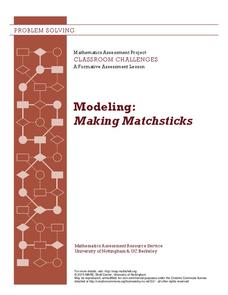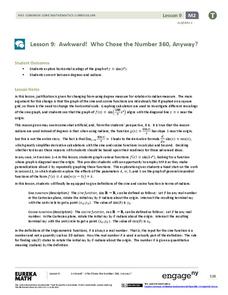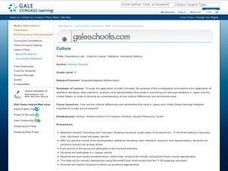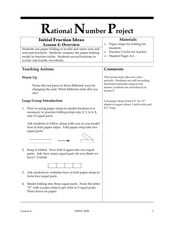EngageNY
Grade 5 Math Module 1, Topic A, Lesson 4
Convert with exponents. The fourth lesson in a series of 18 uses powers of 10 to convert within the metric system. Scholars use their fourth grade knowledge of conversions to write and use the conversion factors containing exponents....
EngageNY
Special Triangles and the Unit Circle
Calculate exact trigonometric values using the angles of special right triangles. Beginning with a review of the unit circle and trigonometric functions, class members use their knowledge of special right triangles to find the value...
EngageNY
Ratios of Fractions and Their Unit Rates 2
Remodeling projects require more than just a good design — they involve complex fractions, too. To determine whether a tiling project will fit within a given budget pupils calculate the square footage to determine the number of...
EngageNY
Interpreting Division of a Fraction by a Whole Number—Visual Models
Divide fractions just like a model does. Pupils visualize the division of a fraction by a whole number by creating models. Scholars make the connection between dividing by a whole number and multiplication before practicing the skill...
West Contra Costa Unified School District
Expository Writing in Math
Pupils engage in an activity where one partner reads directions while the other follows those directions to complete a math task (such as bisecting an angle). As a reflection, they examine products to see what information the best...
EngageNY
Ratios of Fractions and Their Unit Rates
Challenge the class to calculate unit rates using complex fractions. Pupils work through examples of finding unit rates using ratios of fractions. To complete the 11th lesson plan of 22, scholars review sample work and determine whether...
EngageNY
Unit Rate as the Constant of Proportionality
What do unit rates and constants of proportionality have in common? The lesson plan addresses this question and introduces the concept of constant proportionality to the class. Individuals find that the unit rate and the constant of...
EngageNY
Grade 5 Math Module 1, Topic B, Lesson 5
There is more than one way to write a number. The lesson plan provides teachers with a way to teach reading and writing decimals to thousandths using standard, expanded, and unit forms. Pupils work through in-class and homework...
Mathematics Assessment Project
Modeling: Making Matchsticks
Math: The only subject where the solution to a problem is seven million matches. Young scholars first complete an assessment task estimating the number of matches they can make from a tree of given dimensions. They then evaluate provided...
Virginia Department of Education
Modeling Division of Fractions
Provide a meaningful context for learning about the division of fractions with this upper-elementary math lesson. Presented with a simple, real-world problem, young mathematicians work in small groups to develop visual models...
EngageNY
Awkward! Who Chose the Number 360, Anyway?
Don't give your classes the third degree. Use radians instead! While working with degrees, learners find that they are not efficient and explore radians as an alternative. They convert between the two measures and use radians with the...
Curated OER
Industrialization, Chemicals and Human Health - Math
Students review the units of the metric system, and practice estimating measures before actually converting between the two systems of measurement. They participate in activities to visualize a concentration of one part per million....
National Research Center for Career and Technical Education
Transportation, Distribution, and Logistics: Tire and Wheel Assemblies
Is bigger really better? By the end of this lesson, learners will be able to apply formulas for computing the diameter of tires and wheel assemblies. Begin by showing a slide presentation that will review definitions for radius and...
Curated OER
Populations Lab - Cultures Lesson: Statistics / Sampling Patterns
Ninth graders examine the application of statistical sampling, data collection, analysis, and representation that exists in schooling and teenage lifestyles in Japan and the United States.
EngageNY
Properties of Trigonometric Functions
Given a value of one trigonometric function, it is easy to determine others. Learners use the periodicity of trigonometric functions to develop properties. After studying the graphs of sine, cosine, and tangent, the lesson connects...
Curated OER
Marshmallow Fun Day - math
Early learners rotate to different classroom centers and participate in six activities based on using marshmallows to review concepts learned. They make: marshmallow sculptures (geometric shapes), the shape of mittens using colored...
media.yurisnight.net
Science Lesson Plan: Our Solar System: I Wonder?
Ever wonder why Pluto isn't considered a planet? Or how large the Earth is compared to the other inner planets? Explore the universe with a series of projects that simulate different aspects of our solar system. The activities require...
EngageNY
Curves in the Complex Plane
Go around and around on the complex plane. The sixth lesson in a 23-part unit reviews representing numbers in the complex plane. Pupils graph numbers with equal moduli and notice they represent a circle. They continue to explore complex...
Rational Number Project
Initial Fraction Ideas Lesson 4: Overview
First-time fraction fiends make paper-folding models for unit and non-unit fractions. They follow teacher-led directions to make models that show 2, 3, 4, 6, 8, and 12 equal parts. An array of fraction review worksheets are...
EngageNY
Why Call It Tangent?
Discover the relationship between tangent lines and the tangent function. Class members develop the idea of the tangent function using the unit circle. They create tables of values and explore the domain, range, and end behavior of...
West Contra Costa Unified School District
Factoring Quadratic Expressions
Factor in different strategies in a lesson for factoring quadratics. Young mathematicians first create tables and area models to factor quadratic trinomials into two binomials by guess and check. Learners then investigate how they can...
Curated OER
Geometry and Shapes
High schoolers discuss and identify polygons and lines. In this geometry lesson plan, learners review liner, square and cubic units so they can incorporate it into the lesson plan on measurement and creating packing that are cost effective.
EngageNY
An Appearance of Complex Numbers 1
Complex solutions are not always simple to find. In the fourth lesson of the unit, the class extends their understanding of complex numbers in order to solve and check the solutions to a rational equation presented in the first lesson....
EngageNY
Tangent Lines and the Tangent Function
Construct tangent lines and make the connection to tangent functions. An informative instructional activity reviews the geometry origins of the tangent function. Pupils use that information to determine how to construct a tangent to a...























